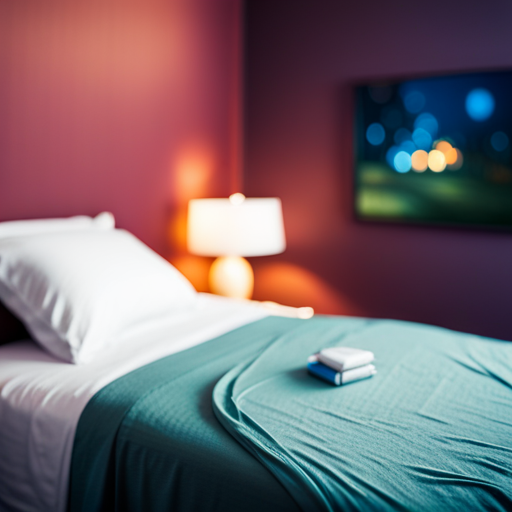Every evening, as I drift into the world of sleep, a bright and detailed collage of dreams reveals itself to me. The colors are intense, the specifics are elaborate, and the feelings are tangible. It feels like my subconscious is creating a cinematic work of art, urging me to unravel its mysterious significance.
But what does this nightly spectacle signify? What does it mean to have vivid dreams every night?
In my quest to uncover the truth, I delved into the realms of research and expert opinions. I discovered that there are several factors that can contribute to the intensity and frequency of vivid dreams. These factors range from sleep quality and psychological influences to medications, substances, and even the sleep environment itself.
By unraveling these intricate threads, we can gain a deeper understanding of the mysterious world that unfolds in our minds while we slumber.
Join me on this enlightening journey as we explore:
- The common causes of vivid dreams
- The role of sleep quality
- Psychological factors
- Medications and substances
- Sleep environment and routine
- Dream interpretation and symbolism
- Lucid dreaming
- The importance of keeping a dream journal
Together, we will navigate the intricate realm of dreams and uncover the hidden messages they hold.
Key Takeaways
- Factors such as sleep disorders, sleep quality, psychological influences, medications, substances, and sleep environment can cause vivid dreams.
- Sleep disorders like insomnia or sleep apnea can disrupt the normal sleep cycle and lead to more intense dreaming.
- Stress, emotional triggers, and traumatic experiences can contribute to more intense and vivid dreams.
- Certain medications, recreational drugs, and alcohol consumption can increase the vividness of dreams.
Common Causes of Vivid Dreams
If you’re having vivid dreams every night, it’s likely your mind’s way of processing emotions and experiences in a more intense and profound manner.
Vivid dreams can be caused by various factors, including sleep disorders and dream recall. Sleep disorders, such as insomnia or sleep apnea, can disrupt the normal sleep cycle, leading to more intense dreaming. Research suggests that people with sleep disorders are more likely to remember their dreams, which could contribute to the vividness.
Additionally, individuals with a higher level of dream recall tend to have more vivid dreams. Dream recall refers to the ability to remember dreams upon waking up. Some people naturally have a better dream recall ability, while others may develop it through practice and keeping a dream journal.
Understanding the common causes of vivid dreams can help shed light on why you may be experiencing them. By exploring the role of sleep quality, we can further delve into the fascinating world of dreams and their impact on our well-being.
The Role of Sleep Quality
Improve your sleep quality and discover the impact it can have on the vividness of your nightly dreams. The role of dreams in our lives is still not fully understood, but research suggests that they play a crucial role in memory consolidation and emotional processing.
When it comes to the vividness of dreams, sleep quality plays a significant role. Studies have shown that individuals who experience poor sleep quality, such as frequent awakenings or disruptions, tend to have more vivid dreams. This may be because fragmented sleep can lead to more time spent in REM sleep, the stage of sleep where dreams occur.
Additionally, stress can have a detrimental effect on sleep quality, leading to more intense and vivid dreams. Stress activates the amygdala, the part of the brain responsible for emotions, which can influence dream content. Therefore, reducing stress and improving sleep quality may help alleviate the intensity of vivid dreams.
Understanding the role of sleep quality in dream vividness can provide valuable insights into managing and interpreting our dreams.
Transitioning into the next section, psychological factors also play a significant role in dream content and intensity.
Psychological Factors
Psychological factors greatly influence the content and intensity of our dreams, but have you ever wondered how our emotions and thoughts shape the vividness of our nightly experiences? Here are four key points to consider:
-
Emotional triggers: Our dreams often reflect our emotional state, with intense emotions leading to more vivid dreams. For example, if we’re feeling anxious or stressed during the day, we may have more vivid and unsettling dreams at night.
-
Trauma effects: Traumatic experiences can have a significant impact on our dreams. People who’ve experienced trauma may have frequent and vivid nightmares that replay the events or emotions associated with their trauma. This can be a way for the mind to process and cope with the traumatic experience.
-
Cognitive processes: Our thoughts and beliefs can also influence the vividness of our dreams. For instance, individuals with a rich imagination or who engage in creative activities may have more vivid and fantastical dreams.
-
Dream recall: The act of remembering and reflecting on our dreams can enhance their vividness. Keeping a dream journal or discussing dreams with others can make us more attuned to our dream experiences.
Understanding these psychological factors can shed light on why we have vivid dreams every night. However, it’s important to note that medications and substances can also influence dream vividness.
Medications and Substances
Take a moment to consider how medications and substances can impact the intensity and content of your dreams. Certain medications and recreational drugs have been known to affect the dreaming process. For instance, some antidepressants, such as selective serotonin reuptake inhibitors (SSRIs), have been associated with an increase in vivid dreaming. This is believed to be due to the way these medications interact with neurotransmitters in the brain.
Similarly, certain recreational drugs, such as cannabis and hallucinogens, can also lead to more intense and vivid dreams.
Alcohol consumption is another factor that can influence the nature of your dreams. While alcohol initially acts as a sedative, it can disrupt the normal sleep cycle, leading to more fragmented and less restful sleep. As a result, the REM stage, which is associated with dreaming, may become more pronounced when alcohol is consumed before bed. This can result in more vivid and sometimes even disturbing dreams.
Moving on to the next section about sleep environment and routine, it is important to note that our sleeping environment and daily habits can also play a role in the vividness of our dreams.
Sleep Environment and Routine
Create a sleep environment and routine that promotes relaxation and sets the stage for a peaceful night’s rest.
Creating a peaceful sleep environment is essential for reducing the occurrence of vivid dreams. Start by ensuring your bedroom is quiet, dark, and at a comfortable temperature. Use blackout curtains or an eye mask to block out any excess light, and consider using earplugs or a white noise machine to minimize any disruptive sounds. Keep your bedroom clean and clutter-free, as a tidy space can contribute to a sense of calmness. Additionally, invest in a comfortable mattress and pillows to greatly improve the quality of your sleep.
Establishing a consistent bedtime routine is also crucial for promoting a peaceful sleep environment. This routine should include activities that help you unwind and relax before bed. Consider incorporating practices such as reading a book, taking a warm bath, or practicing relaxation techniques like deep breathing or meditation. Avoid stimulating activities, such as using electronic devices or engaging in intense exercise, close to bedtime.
By creating a peaceful sleep environment and establishing a consistent bedtime routine, you can enhance your chances of having a restful night’s sleep and potentially reduce the frequency of vivid dreams. Transitioning into the subsequent section about ‘physical health and hormonal changes’, it’s important to note that these factors can also contribute to the occurrence of vivid dreams.
Physical Health and Hormonal Changes
Hormonal imbalances, illnesses, and medical conditions can have a significant impact on our physical health and overall well-being. These factors can disrupt the normal functioning of our body, leading to various symptoms and health issues.
Research suggests that hormonal imbalances, such as those related to thyroid disorders or reproductive hormones, can affect our sleep patterns, energy levels, mood, and even cognition. Additionally, illnesses and medical conditions, ranging from chronic pain to autoimmune disorders, can also disrupt our sleep and contribute to hormonal imbalances, further exacerbating the impact on our physical health.
Hormonal Imbalances
Are you experiencing an excess of exciting and extraordinary dreams every evening due to a potential hormonal imbalance?
Hormonal imbalances can indeed affect your dream patterns and intensity. When the hormones in your body aren’t properly balanced, it can lead to various symptoms such as mood swings, fatigue, weight gain, and even changes in your sleep patterns.
One of the ways in which hormonal imbalances can manifest is through vivid dreams. Research suggests that fluctuating levels of estrogen and progesterone, particularly during the menstrual cycle or menopause, can contribute to more intense dreaming.
If you suspect that hormonal imbalances are behind your vivid dreams, it’s important to consult with a healthcare professional who can evaluate your symptoms and recommend appropriate treatment options.
Moving forward, let’s explore how illnesses and medical conditions can also impact your dream experiences.
Illnesses and Medical Conditions
Experiencing an illness or medical condition can greatly impact the intensity and content of your dream experiences. Mental disorders, such as anxiety, depression, and schizophrenia, have been linked to changes in dreaming patterns.
For instance, individuals with anxiety commonly report having more vivid and disturbing dreams. Sleep disorders, such as insomnia and sleep apnea, can also influence dream recall and vividness. Studies have shown that people with insomnia tend to have more negative and emotionally charged dreams.
On the other hand, medical conditions like Parkinson’s disease and epilepsy have been associated with an increase in dream vividness and complexity. Understanding the relationship between illnesses and dream experiences can provide valuable insights into the potential underlying mechanisms.
Moving forward, exploring the interpretation and symbolism of these dreams allows for a deeper understanding of their significance in your waking life.
Dream Interpretation and Symbolism
Dream interpretation and symbolism can be like navigating a labyrinth of mystical nonsense, leaving you questioning your sanity and the meaning of life itself. However, understanding the symbols and meanings behind our dreams can provide valuable insights into our subconscious mind.
Dream analysis is a method used to interpret the content of dreams, deciphering the hidden messages and symbols that our minds create during sleep. By examining the various elements of a dream, such as objects, settings, and characters, we can gain a deeper understanding of our own thoughts and emotions.
Dream symbols are the key to unlocking the meaning behind our dreams. These symbols can vary greatly from person to person, as they are influenced by our personal experiences, beliefs, and cultural backgrounds. For example, dreaming of water may represent cleansing and renewal for one person, while for another it may symbolize emotional turmoil. It is important to keep a dream journal and reflect on the recurring symbols in order to better understand their significance in our lives.
As we delve into the realm of dream interpretation and symbolism, we can begin to explore the fascinating phenomenon of lucid dreaming. Lucid dreaming occurs when a person becomes aware that they are dreaming while still in the dream state. This heightened state of consciousness allows individuals to actively participate and control their dreams, opening up a world of infinite possibilities.
So, let us venture further into the realm of lucid dreaming and uncover the secrets that lie within.
Lucid Dreaming
Lucid dreaming is a fascinating phenomenon that occurs when you become aware that you’re dreaming while you’re still in the dream state. It’s like having a heightened sense of consciousness within your dream world, allowing you to control and manipulate the events and outcomes of your dreams.
For those who experience vivid dreams every night, learning how to lucid dream can be an incredibly beneficial skill to develop. By being able to control your dreams, you can turn them into exciting adventures, explore your deepest desires, and even practice skills or scenarios in a safe and controlled environment.
One of the key techniques for inducing lucid dreaming is enhancing dream recall. This involves training yourself to remember more details from your dreams, which in turn increases your chances of recognizing when you’re dreaming. Techniques such as keeping a dream journal, where you write down your dreams immediately upon waking, can greatly improve your dream recall and increase your likelihood of having lucid dreams.
By enhancing dream recall and practicing techniques to induce lucid dreaming, you can unlock the full potential of your dream world and experience a level of control and creativity like never before.
So let’s explore the next step in this journey: keeping a dream journal.
Keeping a Dream Journal
Keeping a dream journal is an essential tool for developing a deep connection with your subconscious mind and unlocking the potential of your dream world. By recording your dreams immediately upon waking up, you can improve your dream recall and gain valuable insights into your emotional state and subconscious desires.
Here are some key benefits of keeping a dream journal:
-
Enhanced Dream Recall: Writing down your dreams regularly helps improve your ability to remember them in more detail. This can lead to a deeper understanding of the symbols, themes, and patterns that appear in your dreams.
-
Emotional Impact: Dreams often reflect our innermost thoughts, fears, and desires. By documenting your dreams, you can gain insight into your emotions and how they may be influencing your waking life.
-
Symbolic Analysis: A dream journal allows you to analyze the symbols and imagery that appear in your dreams. This can help you uncover hidden meanings and messages from your subconscious mind.
-
Dream Patterns: By tracking your dreams over time, you may start to notice recurring themes or patterns. This can provide valuable information about your subconscious thoughts and concerns.
-
Personal Growth: Keeping a dream journal can be a transformative tool for personal growth and self-discovery. It can help you gain a deeper understanding of yourself and provide guidance for your waking life.
Keeping a dream journal can greatly enhance your understanding of your dreams, emotions, and subconscious mind. It is an important step in unlocking the potential of your dream world. However, if your vivid dreams are causing distress or interfering with your daily life, it may be time to seek professional help.
When to Seek Professional Help
If you’re finding that your dreams are causing distress or interfering with your daily life, it’s a good idea to seek professional help. Signs of severe sleep disturbances, such as frequent nightmares, intense emotions during dreams, or the inability to fall back asleep after a vivid dream, may indicate underlying issues that require intervention. Consulting with a sleep specialist or therapist can provide valuable insights and guidance in managing and understanding your dreams.
In addition to seeking professional help, it’s important to prioritize self-care and stress management to alleviate the impact of vivid dreams on your well-being. Engaging in relaxation techniques, such as deep breathing exercises or meditation, before bed can promote a calmer state of mind and potentially reduce the intensity of your dreams. Establishing a consistent sleep routine, including a regular bedtime and wake-up time, can also contribute to better sleep quality.
To help you visualize the importance of self-care and stress management, I’ve created a table below:
| Self-Care Techniques | Stress Management Strategies | Benefits |
|---|---|---|
| Deep breathing exercises | Regular exercise | Reduces anxiety and promotes relaxation |
| Meditation | Time management skills | Enhances overall well-being and improves sleep |
| Establishing a consistent sleep routine | Seeking social support | Improves sleep quality and reduces the impact of stress |
| Engaging in hobbies or activities that bring joy | Practicing mindfulness | Boosts mood and reduces stress levels |
By incorporating these self-care techniques and stress management strategies into your daily routine, you can minimize the negative effects of vivid dreams and improve your overall sleep experience. Remember, taking care of your mental and emotional well-being is crucial for maintaining a healthy and fulfilling life.
Frequently Asked Questions
Can vivid dreams every night be a sign of a sleep disorder?
Having vivid dreams every night can indeed be a sign of a sleep disorder. These dreams can have psychological implications, as they may indicate underlying anxiety, stress, or unresolved trauma. Additionally, certain medical conditions such as sleep apnea, narcolepsy, or restless leg syndrome can also contribute to vivid dreaming.
It’s important to consult with a healthcare professional if you’re experiencing vivid dreams regularly, as they can help identify and address any underlying issues.
Is it normal to remember vivid dreams every night?
Remembering vivid dreams every night is not necessarily abnormal. It could indicate a higher level of dream recall, which varies among individuals. However, if these dreams are causing distress or affecting sleep quality, it may be worth exploring techniques for lucid dreaming or dream interpretation.
Lucid dreaming techniques can help individuals gain control over their dreams, while dream interpretation can provide insight into the subconscious mind. Consulting with a sleep specialist or therapist can offer further guidance.
Can certain foods or drinks affect the occurrence of vivid dreams?
According to research, certain foods and drinks can indeed affect the occurrence of vivid dreams. For example, consuming caffeine, especially close to bedtime, has been found to increase dream intensity.
On the other hand, alcohol has been shown to suppress dream recall. A study found that individuals who consumed alcohol before sleep experienced fewer dreams and had difficulty remembering them.
These findings highlight the impact that our dietary choices can have on our dream experiences.
Are there any natural remedies or techniques to reduce the frequency of vivid dreams?
There are several natural methods that can help reduce the frequency of vivid dreams. One effective technique is to keep a dream journal. By writing down your dreams upon waking, you may gain insight into any patterns or triggers that are causing the vivid dreams.
Additionally, practicing relaxation techniques such as deep breathing or meditation before bed can help promote a more restful sleep, potentially reducing the occurrence of vivid dreams.
Can vivid dreams every night affect overall sleep quality and lead to daytime fatigue?
Vivid dreams every night can have a significant impact on overall sleep quality and lead to daytime fatigue. These intense dreams can disrupt the normal sleep cycle, preventing the individual from reaching deep, restorative sleep. As a result, they may wake up feeling tired and drained.
Furthermore, the vivid dream interpretation can affect mental health, as it may involve intense emotions or traumatic experiences. It’s important to find ways to manage and reduce the frequency of these dreams to improve sleep and overall well-being.
Conclusion
In conclusion, having vivid dreams every night can be a fascinating and complex experience. There can be various reasons behind these vivid dreams, such as sleep quality, psychological factors, medications, and sleep environment. It is important to remember that dreams are highly subjective and can have different interpretations. Keeping a dream journal and exploring the world of lucid dreaming can provide a deeper understanding of these dreams. However, if these vivid dreams become distressing or interfere with daily functioning, it’s advisable to seek professional help. As the saying goes, "Dreams are the windows to our soul, revealing the depths of our subconscious."









